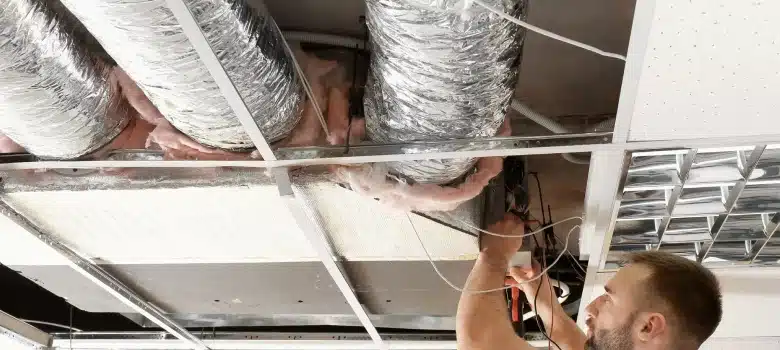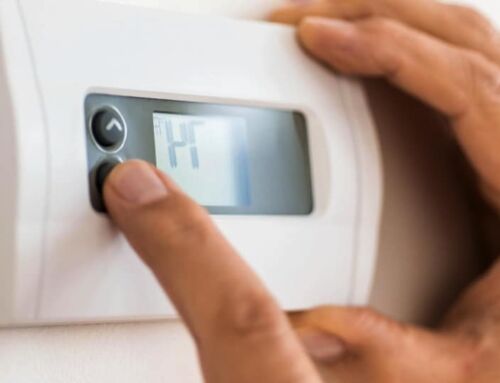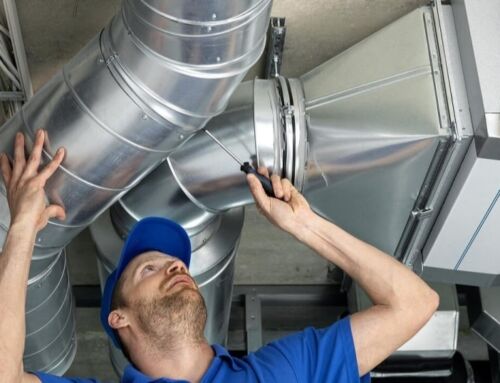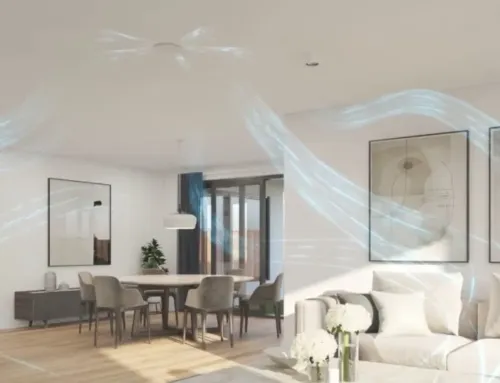As the mercury soars in Sydney, the thought of retreating into a cool, air-conditioned living room is more than a luxury – it’s a necessity.
The decision to install or upgrade a ducted air conditioning system and enjoy temperature control all year round does come with a few important questions.
The most common question being…
“How much is ducted air conditioning going to cost me?”
Ducted air conditioning, with its promise of evenly distributed cooling (or heating) across multiple rooms, represents the pinnacle of home climate control.
Unlike portable or split systems, a ducted setup is integrated into the very fabric of your home, offering a seamless, efficient, and aesthetically pleasing solution to temperature management.
But with great comfort comes great financial consideration. The ducted air conditioning cost in Sydney can vary widely, influenced by factors such as the size of your home, the system’s capacity, and the complexity of installation.
In this guide, we’ll help you budget with confidence by covering:
- Key factors influencing ducted air conditioning costs
- A comprehensive price breakdown
- How to select a top-notch ducted AC installer
From average prices to hidden costs, we’ll provide insights you need to make an informed decision.
Read on to learn everything you need to know.
Key Factors Influencing Ducted Air Conditioning Costs in Sydney
When considering the installation of a ducted air conditioning system, it’s essential to understand that several factors will significantly influence the overall ducted air conditioning cost.
These elements ensure that each installation is unique, and tailored to meet the specific needs of your home or commercial space.
System Size and Capacity
The larger your home or the area you wish to climate control, the more powerful your system needs to be.
A/C system capacity is measured in kilowatts (kW), and a system that’s too small for your space won’t cool or heat effectively, leading to inefficiencies and increased operating costs.
An overly large system can lead to unnecessary upfront expenses.
The complexity of Installation
Factors such as the layout of your home, the accessibility of your ceiling space, and whether you have a single or multi-storey property will influence the installation process.
More complex installations, such as those in homes with limited access or those requiring extensive ductwork modifications, will typically incur higher costs.
Quality and Features of the System
Systems with higher energy efficiency ratings, advanced filtration options, and smart home compatibility may come with a higher price tag initially but can offer significant savings in the long run through reduced energy bills.
Choosing a reputable brand known for durability and performance can also be a cost-effective decision over time.
Additional Components and Customisation
Zoning capabilities, which allow you to control the temperature in different areas of your home independently, can add to the initial cost but provide greater comfort and efficiency.
Other customisations, such as specific controller types, enhanced air filtration systems, or integration with existing home automation systems, will also be reflected in the final price.
Average Ducted Air Conditioning Cost Breakdowns
| System Capacity (kW) | Basic Installation | Mid-Range System | High-End System |
| Up to 10kW | $5,000 – $7,000 | $7,000 – $10,000 | $10,000 – $14,000 |
| 10kW to 15kW | $7,000 – $9,000 | $9,000 – $12,000 | $12,000 – $16,000 |
| 15kW to 20kW | $9,000 – $11,000 | $11,000 – $15,000 | $15,000 – $20,000 |
| 20kW and above | $11,000 – $13,000 | $13,000 – $18,000 | $18,000 – $25,000 |
Additional Costs to Consider
- Electrical Upgrades: If your current electrical system requires upgrades to support the new air conditioning system, costs can range from $500 to $2,000.
- Ductwork Modifications: Modifying or extending existing ductwork can add $2,000 to $5,000, depending on complexity.
- Annual Maintenance: Regular servicing to maintain the efficiency and longevity of the system usually costs between $150 and $300 per annum.
Cost-Saving Tips and Preventive Measures
Investing in ducted air conditioning is a significant financial decision. There are several strategies you can employ to ensure that you’re not only saving on the upfront costs but also reducing the long-term running expenses.
Here are some cost-saving tips and preventive measures to help you avoid major expenses while enjoying the comfort of your new A/C system.
Choose the Right Size and Capacity
An oversized system will lead to unnecessary expenditure and increased energy bills, while an undersized system will have to work harder, reducing efficiency and lifespan.
Invest in Energy Efficiency
While high-efficiency systems might come with a higher initial price tag, they can offer significant savings on your energy bills over time.
Look for systems with a high Energy Star rating and consider features like inverter technology, which can adjust the compressor speed and drastically reduce energy consumption.
Regular Maintenance
Scheduling regular maintenance can prevent minor issues from becoming major expenses.
Keeping filters clean, ensuring ducts are not leaking, and having the system checked annually by a professional can extend the life of your air conditioning system and maintain its efficiency, thereby saving you money.
Smart Thermostat Integration
Installing a smart thermostat can offer significant savings by allowing you to better control your heating and cooling needs.
These devices can learn your schedule and adjust the temperature accordingly, ensuring that you’re not wasting energy cooling an empty house. They also provide the convenience of remote control, so you can adjust settings on the go.
Utilise Zoning Capabilities
If your system allows for it, zoning can be a highly effective way to reduce costs. By controlling the temperature in different areas of your home independently, you can avoid cooling or heating rooms that are not in use.
This targeted approach ensures energy is not wasted, leading to lower operating costs.
Insulation and Sealing
Improving your home’s insulation and sealing any leaks can significantly reduce the workload on your ducted air conditioning system.
Ensuring that windows, doors, and ductwork are properly sealed and insulated helps retain the desired temperature, reducing the system’s need to cycle on and off frequently.
Consider Off-Peak Operation
If your energy provider offers off-peak rates, take advantage of these times to run your air conditioning system.
Cooling your home during off-peak hours can reduce energy costs and still provide a comfortable environment during the warmer parts of the day.
How to Select an A/C Service Provider
A reputable company can make the difference between an efficient, long-lasting installation and one that’s plagued with problems.
Here are key pointers to ensure you’re partnering with a company that will deliver quality and value.
Look for Experience and Expertise
A company with a solid track record in ducted air conditioning installations is likely to understand the unique needs of homes and commercial spaces in the area.
Look for providers with extensive experience and ask for case studies or references.
Check for Licences and Certifications
A reputable air conditioning service provider should have all the necessary licences and certifications required by Australian law.
This not only ensures that they are qualified to perform the installation but also that they adhere to strict safety and quality standards.
Assess Their Range of Services
Ideally, you want a provider that offers a comprehensive range of services, from consultation and installation to maintenance and repair.
A company that can support you throughout the life of your air conditioning system will provide more value in the long run.
Read Reviews and Testimonials
Customer reviews and testimonials can provide insights into the company’s reliability and quality of work. Look for feedback on various platforms, including Google, social media, and industry-specific forums.
Compare Quotes (But Don’t Choose on Price Alone)
While it’s important to get a good deal, choosing a service provider based solely on price can be a mistake. Evaluate what is included in the quotes you receive and consider the value of the service being offered.
Remember, a slightly higher investment upfront can save you from costly repairs and inefficiencies down the line.
Wrapping It Up: Your Guide to Ducted Air Conditioning Costs in Sydney
Here’s a summary of the most important cost points to consider:
- System Size and Capacity: Tailor the system’s size to your property to ensure efficiency and cost-effectiveness.
- Installation Complexity: The layout and accessibility of your home can significantly affect installation costs.
- System Quality and Features: Opt for systems with higher energy efficiency and features that match your needs for long-term savings.
- Additional Costs: Remember to account for potential extra expenses such as electrical upgrades and ductwork modifications.
- Cost-saving tips: Regular maintenance, smart thermostats, and proper insulation can reduce running costs.
- Choosing a Service Provider: Look for experience, licensing, comprehensive services, and strong after-sales support.
Investing in ducted air conditioning is a significant but may be a worthwhile decision.
With the right preparation and understanding of the ducted air conditioning costs involved, you can ensure that your investment is both sound and sustainable.
Ready to Beat the Heat? Trust HunterCON
At HunterCON Electrical & Air, we understand that installing ducted air conditioning is a significant decision that comes with many considerations.
Our team of experts is dedicated to guiding you through every step of the process, from initial consultation to installation and beyond.
We’re committed to providing personalised advice tailored to your specific needs and ensuring you get the most out of your investment.
Whether you’re looking to understand more about your options, need help budgeting for your new system, or are ready to get a quote, we’re here to help.
Contact HunterCON Electrical & Air to claim a 100% obligation-free quote today.







Leave A Comment